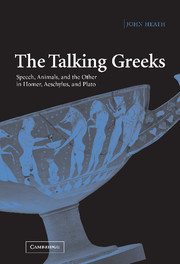Book contents
- Frontmatter
- Contents
- Preface and acknowledgments
- Introduction
- Part I SPEECH, ANIMALS, AND HUMAN STATUS IN HOMER
- Part II LISTENING FOR THE OTHER IN CLASSICAL GREECE
- Part III SPEECH, ANIMALS, AND HUMAN STATUS IN CLASSICAL ATHENS
- Chapter 5 Disentangling the beast: Humans and other animals in the Oresteia
- Chapter 6 Socratic silence: The shame of the Athenians
- Epilogue
- Bibliography
- Index
Chapter 5 - Disentangling the beast: Humans and other animals in the Oresteia
Published online by Cambridge University Press: 22 September 2009
- Frontmatter
- Contents
- Preface and acknowledgments
- Introduction
- Part I SPEECH, ANIMALS, AND HUMAN STATUS IN HOMER
- Part II LISTENING FOR THE OTHER IN CLASSICAL GREECE
- Part III SPEECH, ANIMALS, AND HUMAN STATUS IN CLASSICAL ATHENS
- Chapter 5 Disentangling the beast: Humans and other animals in the Oresteia
- Chapter 6 Socratic silence: The shame of the Athenians
- Epilogue
- Bibliography
- Index
Summary
The Greeks of the polis knew a thin line separated their own humanity from the life of the beast. Hesiod provides the first explicit testimony to the difference between the two worlds:
But you, Perses, deliberate on this in your heart and listen now to right (dikê), forgetting violence altogether. For the son of Cronus drew up this law for men, that fish and beasts and flying birds eat one another, since right is not in them. But to mankind he gave right which is by far the best. For if anyone knows the right and is willing to speak it (agoreusai), to him far-seeing Zeus gives prosperity.
(Op. 274–81)Man alone has access to justice, whereas animals are condemned to live by violence, turning on one another. But in an agrarian world where words are to be matched by deeds, justice is not a passive entitlement but must be “spoken aloud” and acted upon. For, as Hesiod continues, there is no prosperity for those whose words betray their humanity, for those who lie (pseusetai, 283) and swear falsely, who know one thing and speak forth another. Justice requires the correct use of language. As the poet notes in his other epic, speech is intimately linked with justice and the just community:
All the people look towards him [the Muse-favored king] as he decides cases with just judgements. Speaking out unerringly he quickly brings even a great dispute to a wise end. For this is why the wise are kings, since in the agora they easily accomplish restitution for those who have been wronged, persuading them with gentle words.
(Theog. 84–90)- Type
- Chapter
- Information
- The Talking GreeksSpeech, Animals, and the Other in Homer, Aeschylus, and Plato, pp. 215 - 258Publisher: Cambridge University PressPrint publication year: 2005



